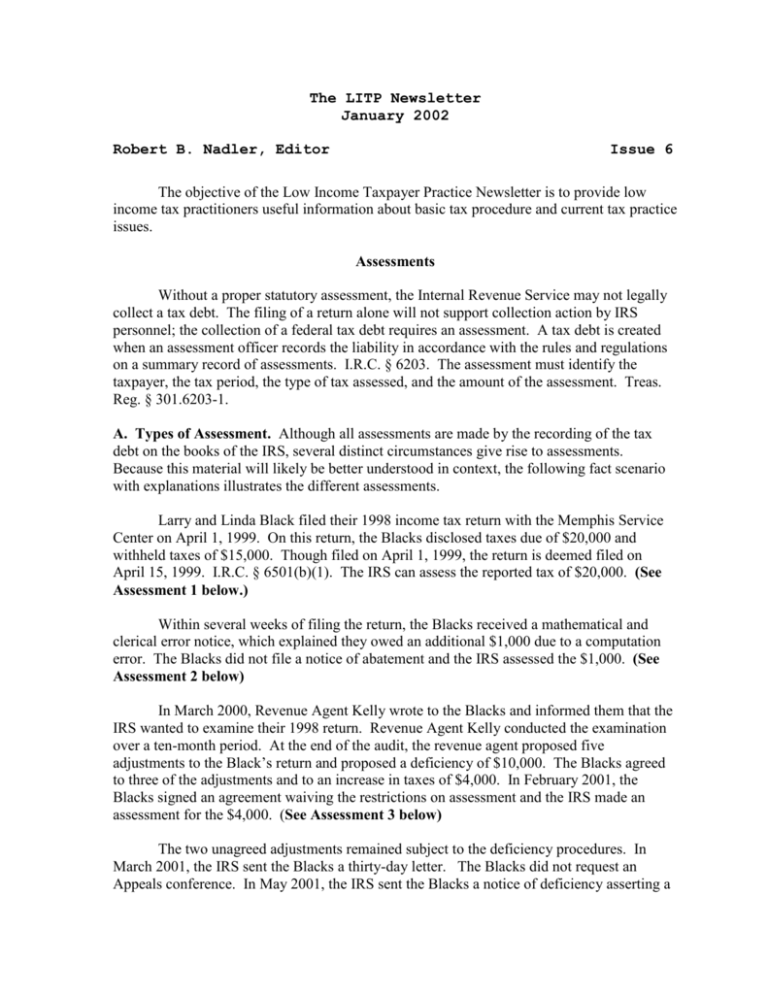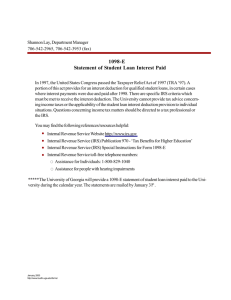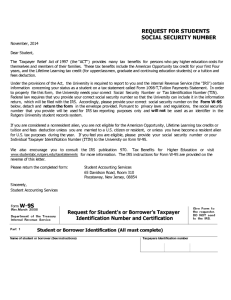
The LITP Newsletter
January 2002
Robert B. Nadler, Editor
Issue 6
The objective of the Low Income Taxpayer Practice Newsletter is to provide low
income tax practitioners useful information about basic tax procedure and current tax practice
issues.
Assessments
Without a proper statutory assessment, the Internal Revenue Service may not legally
collect a tax debt. The filing of a return alone will not support collection action by IRS
personnel; the collection of a federal tax debt requires an assessment. A tax debt is created
when an assessment officer records the liability in accordance with the rules and regulations
on a summary record of assessments. I.R.C. § 6203. The assessment must identify the
taxpayer, the tax period, the type of tax assessed, and the amount of the assessment. Treas.
Reg. § 301.6203-1.
A. Types of Assessment. Although all assessments are made by the recording of the tax
debt on the books of the IRS, several distinct circumstances give rise to assessments.
Because this material will likely be better understood in context, the following fact scenario
with explanations illustrates the different assessments.
Larry and Linda Black filed their 1998 income tax return with the Memphis Service
Center on April 1, 1999. On this return, the Blacks disclosed taxes due of $20,000 and
withheld taxes of $15,000. Though filed on April 1, 1999, the return is deemed filed on
April 15, 1999. I.R.C. § 6501(b)(1). The IRS can assess the reported tax of $20,000. (See
Assessment 1 below.)
Within several weeks of filing the return, the Blacks received a mathematical and
clerical error notice, which explained they owed an additional $1,000 due to a computation
error. The Blacks did not file a notice of abatement and the IRS assessed the $1,000. (See
Assessment 2 below)
In March 2000, Revenue Agent Kelly wrote to the Blacks and informed them that the
IRS wanted to examine their 1998 return. Revenue Agent Kelly conducted the examination
over a ten-month period. At the end of the audit, the revenue agent proposed five
adjustments to the Black’s return and proposed a deficiency of $10,000. The Blacks agreed
to three of the adjustments and to an increase in taxes of $4,000. In February 2001, the
Blacks signed an agreement waiving the restrictions on assessment and the IRS made an
assessment for the $4,000. (See Assessment 3 below)
The two unagreed adjustments remained subject to the deficiency procedures. In
March 2001, the IRS sent the Blacks a thirty-day letter. The Blacks did not request an
Appeals conference. In May 2001, the IRS sent the Blacks a notice of deficiency asserting a
deficiency of $6,000. The Blacks filed a petition in Tax Court. Prior to trial, the parties
settled one of the issues and the remaining issue went to trial. The agreed issue amounted to
$2,500 in taxes. The Blacks wanted to stop interest from running and paid the additional tax.
Upon receipt of the payment, the IRS made an assessment. (Assessment 4 below)
After a trial before the Tax Court, the court ruled in part for the IRS and in part for
the Blacks and entered a decision for a deficiency of $950. Although the Blacks did not
agree with the decision, they did not appeal. When the Tax Court’s decision became final,
the IRS assessed the tax. (Assessment 5 below)
If, at any time before the Tax Court decision became final, the IRS learned that the
Black’s were attempting to hide their assets, the IRS could make a jeopardy assessment.
(Assessment 6 below)
Assessment 1. Summary Assessment. When a taxpayer files a voluntary return, the IRS
has authority to assess the amount reported as tax on the income tax return.
I.R.C. § 6201(a)(1). This is often called a self-assessment, because the taxpayer has both
agreed to the tax and reported the same on the return.
Assessment 2. Mathematical And Clerical Errors. In several situations, Congress has
given the IRS with authority to make assessments without following the deficiency
procedures. I.R.C. § 6213(b)(1).1
Assessment 3. Audit Assessments. There are two types of audit assessments-- agreed and
unagreed. After an income tax return is filed, the IRS is prohibited by statute from making
additional assessments without following the deficiency procedures.2 If the IRS proposes a
deficiency in tax, the taxpayer and the IRS can enter into an agreement waiving the
restrictions on assessments. I.R.C. § 6213(d). The IRS often uses Form 870, “Waiver of
Restrictions on Assessment” or similar forms for this purpose. If the taxpayer does not agree
to the assessment, but fails to file a timely petition in the Tax Court, the IRS can assess the
tax. I.R.C. § 6213(c).
Assessment 4. Amounts Paid as a Tax. When a taxpayer send the IRS a payment, the IRS
is authorized to assess the amount of tax paid. I.R.C. § 6213(b)(4).
Assessment 5. Decision of Tax Court. The IRS may assess a court determination of a
deficiency after the decision becomes final. I.R.C. § 6215(a).
Assessment 6. Jeopardy and Termination Assessments. If the IRS determines that the
assessment or collection of the tax will be jeopardized by delay, it is authorized to
immediately assess a tax without regard for the deficiency procedures. I.R.C. § § 6851,
6861.
1
For a more complete discussion of mathematical and clerical errors, see The LITP Newsletter,
Issue 5, December 2002.
2 The deficiency procedures only apply to income, gift, and estate taxes. See Mathematical and Clerical Errors
in Assessment 2 for exceptions to the deficiency procedures.
2
B. Payments Not Assessed. Withheld taxes and estimated payments of taxes are not
assessed when made. They are deemed paid on April 15. I.R.C. § 6513(c)(2).
C. Substitute For Return (SFR). If a taxpayer does not file a return, the IRS has authority
to prepare a return. I.R.C. § 6020(b). Neither section 6020 nor any other section gives the
IRS authority to make an assessment from a SFR. If the taxpayer signs the IRS prepared
return, the IRS may treat the return as the taxpayer’s return and assess the tax.
I.R.C. § 6020(a). If the taxpayer does not agree to the assessment, the IRS must follow the
deficiency procedures.
1) Filing a return prior to assessment. When the taxpayer files a return prior to an
assessment, the same situation exists as if no SFR existed. The IRS has discretion to accept
the return as filed, but the IRS has the same right to raise issues as if no SFR was prepared,
including the rights under section 6213(b) to make mathematical and clerical error
assessments. At the time that a SFR is prepared, the IRS does not possess up to date
information on the taxpayer’s exemptions, filing status or claims for credits. If the
information on the late filed return is inconsistent or suspect, for example there is a missing
social security number for a dependent, the IRS can properly challenge the claim for the
dependent. But, if the information is consistent, the IRS will probably accept the late filed
return as filed. If the IRS disagrees with the late filed return, it must follow the deficiency
procedures.
2) Filing a return after assessment. The situation is different if the IRS followed
the deficiency procedures and made an assessment. Once an assessment is made, even if the
assessment originates from an SFR, the taxpayer stands in the identical position as any other
taxpayer after an assessment. The deficiency procedures provided the taxpayer with the right
to contest the IRS determination of a deficiency. If the taxpayer filed a Tax Court petition,
there would be a decision reflecting the Court’s redetermination of a deficiency. When the
Court’s decision became final, the IRS would have the right to assess the tax. After a Tax
Court petition is filed, the IRS position is that the act of filing a return is not done for the
purpose of assessing a tax and is not legally valid.3 After the Tax Court decision becomes
final, the taxpayer may not bring a second action with respect to the same taxable year due to
res judicata. If no petition was filed the tax is assessed. Thereafter, the taxpayer is free to
pay the tax and file a claim for refund. But, the taxpayer may not simply file an amended
return.
D. Record of Account. Tax representation often requires knowing the amounts and dates of
assessments. Your client is often not in possession of this information. After getting a power
of attorney, Form 2848, you can call the Practitioner Priority Service (866-860-4259) and
either order a record of account through the telephone menu or wait and speak with an IRS
employee. Often it is more productive to speak with an employee who may be able to
provide you with answers over the phone or fax you the information.
3
See Form 1040 Filed After a Deficiency Assessment not a Valid Return. ILM 200235025. 2002 TNT 17021.
3
E. Breaking News: Voluntary Disclosure Guidelines Revised. The IRS generally looks
favorably on taxpayers coming forward and filing late returns. Nevertheless, in a given case,
there may be potential criminal aspects to the late filing of returns. The IRS has announced it
will consider a taxpayer’s voluntary disclosure along with other factors in determining
whether criminal prosecution will be recommended. Voluntary disclosure creates no
substantive or procedural rights. Although the likelihood of criminal prosecution of our
clients is small, it is helpful to understand the rules applicable to the government’s voluntary
disclosure policy. The revised voluntary disclosure guidelines can be found at IR-2002-135
or 2002 TNT 239-14.
Practice Idea. Premature Assessments. Low-income taxpayers are uniquely threatened by
premature assessments, because collection action may prevent them from being able to pay
for basic living expenses. If the IRS fails to honor a section 6213(b) request to abate an
assessment of a math error, the IRS will begin collection of the tax due.
What action can a representative take to protect a client? Prior to 1996, an action to
enjoin the IRS from premature collection action could only be brought in Federal District
Court. Now, an action to enjoin the IRS from premature collection can be brought in either
the Federal District Court or in Tax Court. I.R.C. § 6213(a). If your clients’ statutory rights
have been denied, you can file a petition in Tax Court to enjoin the IRS. I.R.C. § 6213(a).
The Low Income Tax Practice Newsletter is produced by the Legal Aid Society of Middle Tennessee and
the Cumberlands, the Tennessee Taxpayer Project, Mary Gillum, Project Coordinator, and Robert B.
Nadler, Attorney. The Tennessee Taxpayer Project is funded in part by the IRS LITC Grant Program.
We are interested in any subjects that Legal Aid lawyers would like discussed. Please direct questions or
comments to mgillum@lglaid.org or rnadler@lglaid.org . © 2002, Low Income Tax Practice Newsletter,
all rights reserved.
The information contained in this newsletter is for general guidance only and is not legal advice provided
to a client. The Legal Aid Society and contributors disclaim all responsibility (including negligence) for
all consequences of any person who acts in reliance on the information contained herein.
4





